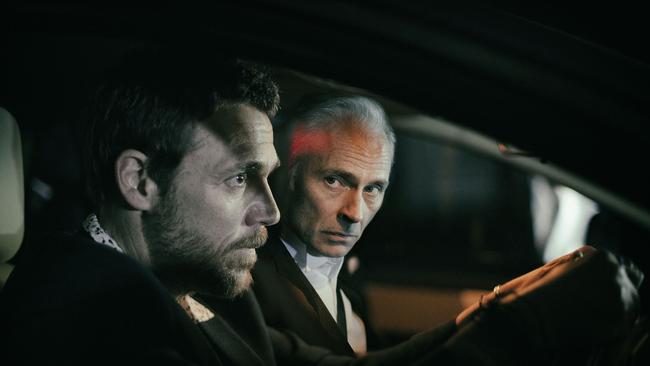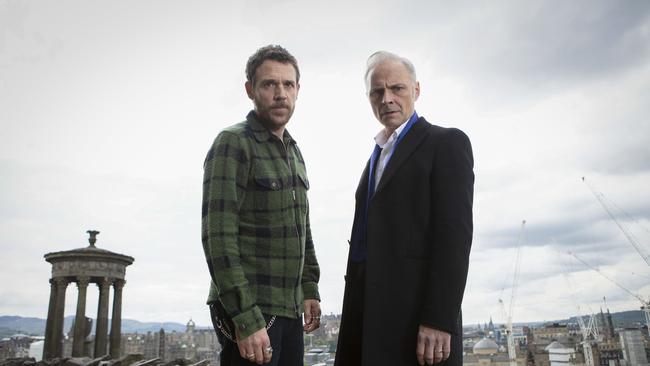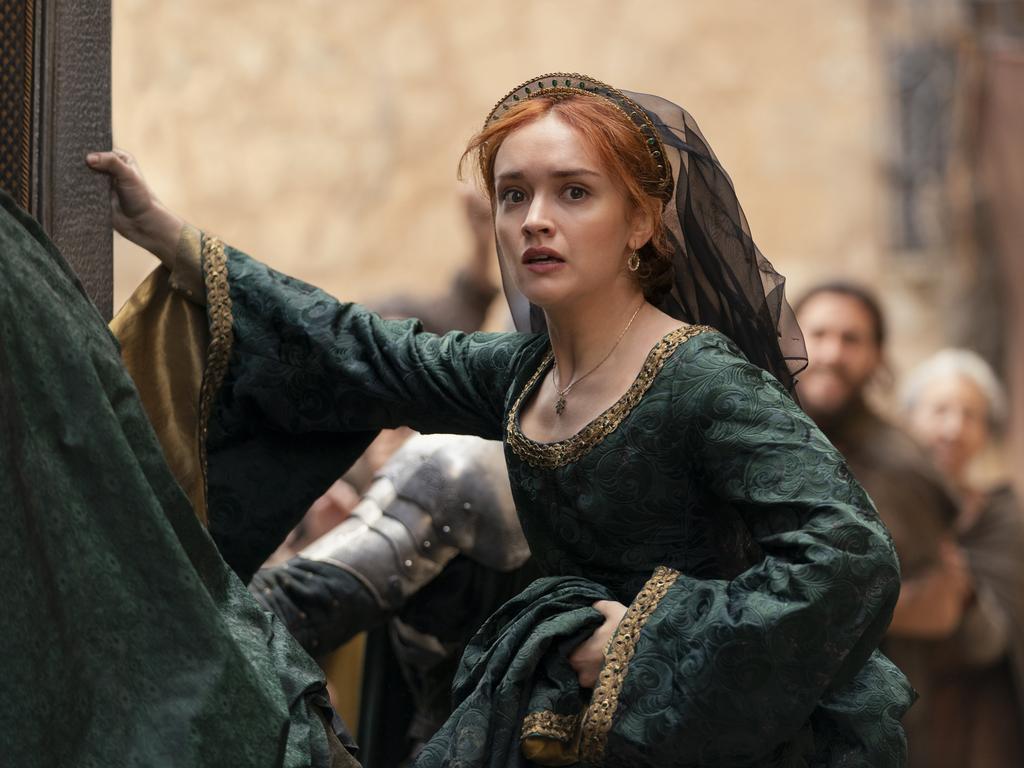Guilt Season 3: Scottish drama about two brothers blends comedy and crime
Shetland’s Mark Bonnar and Game of Thrones’ Jamie Sives return as brothers in Guilt, a wicked parable about the futility of trying to outrun your own past.

“I did have a pipedream of doing a trilogy but that felt like something that was so distant in those early days when it was just about trying to get the show on the air and keeping it on the air,” Neil Forsyth says. “That’s the big challenge. It’s very hard to get a show on television and it’s even harder to keep it there.” Forsyth is the creator and writer of Guilt, Scotland’s most notable TV drama, the third season of which has just reached SBS.
It was the first drama commissioned by the newly formed BBC Scotland channel in 2019 – and has proved an international success, both with audiences and critics, despite the at times mystifying accents and plotting so labyrinthine it makes one’s head spin.
(In France, it was renamed Petit Muerte entre Freres [A Small Murder between Brothers], in Sweden they went for Var Lilla Hemlighet [Our Little Secret] and in Germany they called it Keiner ist schuld [Nobody Is Guilty].)

Forsyth, a former journalist and novelist, is best known, certainly in the UK, for his most famous creation Bob Servant, from the TV series Bob Servant Independent, played by Succession’s Brian Cox. But he also wrote the fine TV drama Eric, Ernie and Me, the story of Eddie Braben, the writer behind the enormous success of Morecambe and Wise.
And Forsyth created the BBC’s critically acclaimed factual drama The Gold, inspired by the true story of the 1983 Brink’s-Mat robbery, and the decades-long chain of events that followed. He’s nothing if not eclectic.
Guilt, already the winner of a number of awards, is the story of two very different brothers, Max and Jake, played by in-demand Mark Bonnar (Shetland) of the lupine face and silver hair, and Jamie Sives (Game of Thrones), somewhat lugubrious by comparison, who as siblings have spent as little time together as they possibly can as their lives have evolved. Unhappily, at the start of the first season their involvement in a hit-and-run leads to them being caught up in a much bigger web of crime.
They immediately panic after the accident; Jake, the driver is uninsured and Max, who is a big shot lawyer, it turns out, takes charge.
It’s the start of some manic, madcap and sometimes violent adventures across 12 hours, a highly entertaining urban noir really, that will send Max to jail, follow him as he seeks revenge in the second season against Lothian gangsters with whom he becomes involved, and in the third sees the brothers seeking some kind of absolution.
“This time around it was interesting to watch the characters in their own ways all seek some level of redemption,” Forsyth says. “What that might look like to each of them was also interesting.”
As Max and his brother desperately look for liberation from the ails that continue to consume them, this seemingly endless cycle of deception, danger and allegation, they encounter a lodestone for opportunists and mentally maimed misfits. However they try to escape they find themselves in yet another version of what Auden called The Great Wrong Place, lucky to escape with their lives.
The brothers are constantly at some kind of crisis point – usually Max’s doing. Maybe too many, given the speed at which the drama is played, and the way in which we as viewers are from the start seduced into imaginatively participating and concurring in a murder. And somewhat uncomfortably uncertain of what we feel about these hapless killers, and with whom we sympathise. As Forsyth says of Guilt’s success, its fundamental dramatic building blocks are very accessible. “Two very different brothers are thrown into an extreme situation and have to uncomfortably work together to get out of it,” he says. “That’s not a complicated dramatic premise in terms of its starting point. I think that helps to sell it.”
As does the often macabre humour. Many have compared Guilt to Noah Hawley’s TV version of the Coen brothers Fargo and there are similarities in the juxtaposition of visual poetry, shocking violence and fiendish plotting. (There’s also a brilliant soundtrack of mainly Scottish bands too. “It’s such a big part of the show, the tone and outlook of it, the feel of it. It’s an intrinsic part so we spend a lot of time on it. When it goes to the edit, we sometimes look at more than 100 tracks just to get the right one set against the action.”)
It’s clever, stylish and engrossing, Forsyth a writer who doesn’t like to mess around. His obvious delight in the darker side of Scottish humour, often called “miserabilist”, that dark vein that runs through the cultural landscape of that nation, ingrained in its collective psyche.
It’s “a repudiation of the twee, coothie, over-sentimentalised, shortbread tin depiction of Scotland,” says writer Jamie Watt. “And, despite the self-perpetuating negativeness of miserabilism, it can have a constructive role in analysing the hypocrisies, shortcomings and taboo subjects of modern Scotland.” And in Guilt, it’s the source of much of the mordant humour.
Forsyth is constantly pulling the rug out from under the brothers. And he does it to us too, just when we are starting to feel comfortable with the direction of his story. The “suddenness and shockiness”, as he calls it a feature of his writing. Max and Jake are always arriving at some kind of crisis point, finding themselves in yet another nefarious goings-on. “It’s really important,” Max says to his brother at one point when escape looks unlikely, “that one of us doesn’t see failure as a natural bedfellow.”
Combining comedy with crime is a difficult balancing act and not many writers bring it off. (Forsyth says his favourite TV show is “The Sopranos, for the storytelling, the characters, the weaving of humour into the drama and the crystal-clear authorial voice.)
Comedy murder mysteries don’t even have their own category in bookstores. Sure, there’s often mordant humour in crime novels and the wisecracks and one-liners that go back to Chandler, but if it’s to work, humour can’t just be a matter of a few jokes to sugar coat the nastiness but be part and parcel of the author’s sensibility.
“I think I write stories that are dramatically driven – I never come up with a story point just to create a funny situation – comedy should play no part in the outlining,” Forsyth says. “Character, drama and story drive the outline. But when I’m writing a script then humour is always available as a way that a character might react to pressure or conflict. I think six-part dramas where no one says anything funny actually feel unrealistic and superficial because that doesn’t really reflect real life.”
The third season starts off with an episode called The Clothes on our Backs, and continues the brothers’ attempt to outrun the circumstances that began their ordeal, covering up that hit-and-run that started it all. At their lowest point with, as the title suggests, only the clothes they are wearing, they still must somehow come to terms with the fearsome Lynches, the vicious gangsters whose lives have become entwined with theirs.
Angie Curtis (Ruth Bradley), Jake’s American girlfriend, steals the money that Max has basically stolen from his brother, and they are deported from America. On arrival in Scotland, they are soon in the hands of the Lynches, who are growing the purest organically cultivated marijuana in Scotland. When it is legalised, they’ll be the first out the traps to get licensed.
The brothers are promised a quick death but of course manage to escape but must face up to the inevitable showdown with the fierce Maggie Lynch, played with terrible insouciance by Phyllis Logan. “I’m just a poor widow looking for a bit of wee light in the darkness,” she says at one point, her eyes like a cobra considering its next kill. Look out, too, for a wonderful performance from Scottish acting stalwart David Hayman as the boy’s father, who abandoned them years earlier to work on the oil rigs but with whom they seek refuge in his remote lochside shack.
This final season is a wonderful thrill, the perfect conclusion to Forsyth’s wicked parable about the futility in trying to outrun your own past. “I think the big thing with me, in terms of knowing that the story has come to an end, is that there’s nothing more about these characters that I need to know,” he says. “I think that’s a sign for the writer that it’s time to move on.”
Guilt is streaming on SBS On Demand.







To join the conversation, please log in. Don't have an account? Register
Join the conversation, you are commenting as Logout